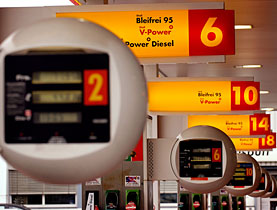Swiss live beyond their ecological means

If everyone in the world lived like the Swiss, we would need 2.4 planets to sustain current lifestyles within a generation, according to the conservation group WWF.
Switzerland came 19th in the Living Planet Report 2008, which said more than three-quarters of the world’s population live in countries whose consumption levels are outstripping environmental renewal.
The United States and Australia rank among the five countries with the largest “footprint” or depletion rate per person, along with the United Arab Emirates, Kuwait and Denmark.
“I’m not really surprised, but I’m disappointed – I’d think Switzerland, as a rich country, would be in a position to do better,” Damien Oettli from WWF Switzerland told swissinfo on Wednesday.
“Switzerland did pretty well in things like forest use and cropland use. Where we did really badly – like most of the industrialised countries – was in energy consumption and the burning of fossil fuels,” he said.
Emissions from fossil fuels – which would be targeted under a successor to the Kyoto climate change accord – were among the top culprits cited by the WWF for the big demands on the planet.
The report, which is published every two years, said the world’s global environmental footprint now exceeds the planet’s capacity to regenerate by 30 per cent. On a per-country basis, the US and China have the largest footprints.
Regionally, only non-EU Europe, Africa, Latin America and the Caribbean remain within their “biocapacity”.
Water consumption is a stark example. The production of food uses vast quantities of water, and as WWF Switzerland pointed out, Switzerland often imports food from countries that don’t have enough water.
Producing a joint of beef needs 15,000 litres, a kilogram of rice 3,400 litres and a cotton T-shirt 2,900 litres. The average Swiss consumes 4,600 litres of water a day – compared with a global average of 3,400 litres.
Threefold solution
The WWF concluded that reckless consumption of “natural capital” was endangering the world’s future prosperity, with clear economic impacts including high costs for food, water and energy.
The Earth’s natural resources are being depleted so quickly that “two planets” would be required to sustain current lifestyles by the mid-2030s, it added.
For Oettli the solution is threefold. “Politicians need to change certain ways in how we deal with natural resources,” he said. “But the economy also has a lot of responsibility; all the traders and food producers and so on have a lot of measures at their disposal to change to a sustainable way of producing goods and services.”
But ultimately, he said, it all boils down to us, the consumers. “We’re the ones who decide what we buy, how we define our lifestyles – we’re the ones guiding the economy and the politicians.”
He added: “There are many products where we really have the choice between ecologically friendly and ecologically damaging products. That’s our consumer behaviour, but our political decisions – who we elect for example – are also important.”
Not a contest
The WWF stressed that the consequences of a global ecological crisis would be even graver than the current economic meltdown.
“The ecological crisis really touches our basic needs, our survival – it’s our food, our shelter,” Oettli said. “The global financial crisis is very severe as well, but ultimately you can’t eat money or shares.”
Despite this, he remains optimistic.
“Although we do this ranking it’s not a contest. The conditions are so different. For example there’s the United Arab Emirates – and they’re really bad! – but they’re living under really difficult conditions. On the other hand there’s Switzerland with all its water and fertile land… You just can’t compare them,” he said.
“So rather than aiming to move up in the ranking, it’s more about having a lifestyle that doesn’t use more resources than are available. And there I’m positive that in two years [when the next report is published] we can reduce our per capita consumption by, say, 10-20 per cent. That has got to be our goal.”
swissinfo, Thomas Stephens
The Living Planet Report is the WWF’s biennial update on the state of the world’s ecosystems.
It describes the changing state of global biodiversity and the pressure on the biosphere arising from human consumption of natural resources.
It is built around two indicators: the Living Planet Index, which reflects the health of the planet’s ecosystems; and the Ecological Footprint, which shows the extent of human demand on these ecosystems.
Kyoto, a 178-nation accord, is a 1997 annex to the 1992 UN climate treaty that requires 37 industrial nations to reduce greenhouse gas emissions by an average of five per cent below 1990 levels by 2010.
The Swiss parliament ratified the Kyoto Protocol on climate change in 2003. Switzerland undertook to reduce its CO2 emissions to ten per cent less than 1990 levels by 2010.
Despite ambitious emission targets, greenhouse gas emissions have actually risen by 0.4% in Switzerland since 1990.
A CO2 law came into force in 2000 to ensure that the Kyoto target was achieved. About a thousand enterprises have taken voluntary measures to reduce their emissions.
But it became clear by 2005 that these measures were not sufficient. It is proving difficult, however, to agree on how to strengthen them.

In compliance with the JTI standards
More: SWI swissinfo.ch certified by the Journalism Trust Initiative











You can find an overview of ongoing debates with our journalists here . Please join us!
If you want to start a conversation about a topic raised in this article or want to report factual errors, email us at english@swissinfo.ch.